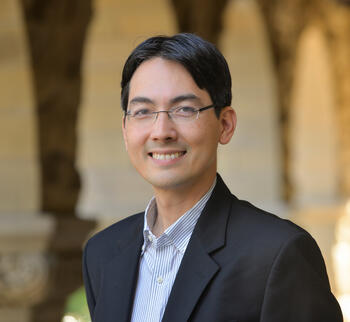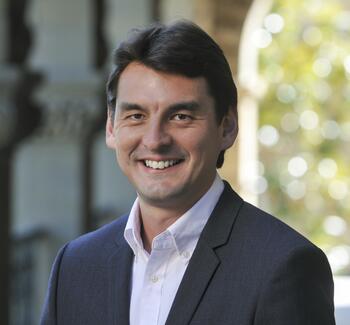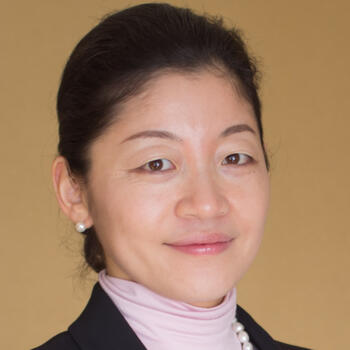In a December 2020 New York Times interview, Ukrainian President Volodymyr Zelensky welcomed Joe Biden’s election as U.S. president. Zelensky observed that Biden “knows Ukraine better than the previous president” and “will really help strengthen relations, help settle the war in Donbas, and end the occupation of our territory.”[1]
While Zelensky’s comments may prove overly optimistic, there is little reason to doubt that the Biden presidency will be good for Ukraine. The incoming president knows the country, and he understands both the value of a stable and successful Ukraine for U.S. interests in Europe and the challenges posed to Ukraine and the West by Russia. That might—might, not will, but might—help break the logjam on the stalemated Donbas conflict, which Zelensky of course would welcome. Perhaps less welcome to the Ukrainian president may be Biden’s readiness to play hardball to press Kyiv to take needed but politically difficult reform and anti-corruption steps. Ukraine’s success as a liberal democracy depends not just on ending its conflict with Russia but also on combating corruption and advancing still necessary economic reforms.
U.S.-Ukraine Relations under Trump
In one sense, U.S. policy toward Ukraine during the Trump administration had its strengths. It continued political and military support for Kyiv, including the provision of lethal military assistance that the Obama administration had been unwilling to provide. It maintained and strengthened Ukraine-related sanctions on Russia. And it took further steps to bolster the U.S. and NATO military presence in central European states on Ukraine’s western border.
However, Donald Trump never seemed committed to his administration’s policy. His primary engagement on Ukraine was his bid to extort Kyiv into manufacturing derogatory information on his Democratic opponent, a bid that led to his impeachment.[2] Beyond that, Trump showed no interest in the country and consistently refused to criticize Vladimir Putin, who has inflicted more than six years of low-intensity war on Ukraine.
The Biden presidency will end this dichotomy in Washington’s approach to Kyiv. The president and his administration will align on policy. That new predictability will mean that Ukrainian officials no longer have to worry about late night presidential tweets or the subjugation of U.S. policy interests to the president’s personal political vendettas.
Two Challenges Confronting Ukraine
As Biden takes office, two principal challenges confront Ukraine. The conflict with Russia poses the first.[3] In March 2014, in the aftermath of the Maidan Revolution, Russian military forces seized Crimea. Weeks later, Russian security forces instigated a conflict in Donbas, masked poorly as a “separatist” uprising. The Kremlin provided leadership, funding, heavy weapons, ammunition, other supplies and, when necessary, regular units of the Russian army. Now in its seventh year, that conflict has claimed the lives of some 13,000 people.
While Moscow illegally annexed Crimea, it has not moved to annex Donbas. It appears instead to want to use a simmering conflict in that eastern Ukrainian region as a means to put pressure on, destabilize and disorient the government in Kyiv, with the goal of making it harder for the government to build a successful Ukrainian state and draw closer to Europe. (Moscow has interfered elsewhere in the post-Soviet space to try to maintain a Russian sphere of influence.)
Without the Kremlin’s cooperation, Kyiv on its own cannot resolve the conflict in Donbas, and Crimea poses an even harder question. However, meeting the second of the challenges facing Ukraine—implementation of reforms and anti-corruption measures needed to build a fair, robust and growing economy—lies largely within Kyiv’s purview. Unfortunately, after a good start by Zelensky and his first government, reforms have stagnated, oligarchs retain undue political and economic influence (including within Zelensky’s Servant of the People party), and the judicial branch remains wholly unreconstructed.[4] Among other things, this depresses much-needed investment in the country.
Progress Toward a Resolution in Donbas?
The Biden presidency might well play a more active role in the moribund negotiating process regarding Donbas. As co-chairs of the “Normandy process,” German Chancellor Angela Merkel and French President Emmanuel Macron have had little success of late in implementation of the 2015 Minsk agreement, which laid out a path to a settlement and restoration of full Ukrainian sovereignty over Donbas.[5] Unfortunately, it appears that the Kremlin calculates that the benefits of keeping Kyiv distracted currently outweigh the costs, including of Western sanctions.
Zelensky believes that a more active U.S. role could change that calculation and inject momentum into the process. At a minimum, the Biden presidency should appoint a special envoy to coordinate with the Germans and French, and, more broadly, with the European Union, Britain, Canada and others on Western support for Ukraine and sanctions against Russia. That position has gone unfilled since September 2019.
Whether Biden, who will face many demands on his time, will choose to engage personally is a different question. He knows Ukraine, having traveled there six times when he served as vice president. And, unlike Trump, who sought quick victories, Biden understands that solving a question like Donbas would require an investment of his time over a sustained period. It would make sense if it became clear that his engagement would shake up things in a way that would increase the prospects of a settlement and return of Donbas to Ukrainian sovereignty.
At first glance, the Kremlin might not welcome that kind of U.S. involvement, but there are good arguments for it. First of all, the United States is Ukraine’s strongest Western supporter, and Washington’s voice carries considerable weight in Kyiv. Second, Russia’s current conflict against Ukraine is not just about Donbas; it is also about Ukraine’s place in Europe, that is, where the country fits between Russia and institutions such as the European Union and NATO.[6] Addressing that question will require diplomatic finesse. Given the trans-Atlantic relationship, which will be revived under Biden, it is difficult to see such a geopolitical discussion taking place without American participation.
As for Crimea, Ukraine cannot at present muster the political, diplomatic, economic and military leverage to effect the peninsula’s return. Still, the U.S. government knows how to do non-recognition policy.[7] It did so for five decades with regard to the Baltic states’ incorporation into the Soviet Union. The Biden presidency will remain supportive of Kyiv’s claim to Crimea and not recognize its annexation by Russia—and the White House will express this view.
Domestic Reform
After an encouraging start on reform, Zelensky wavered in 2020. He has to do more, and Biden can be helpful, though in a manner the Ukrainian president may not appreciate. A big part of the problem is that Zelensky himself seems to have lost his way. Ruslan Ryaboshapka, his reformist first prosecutor general, observed that “Instead of fighting oligarchs, [Zelensky] chose to peacefully coexist with them.”[8] Biden could well prove the kind of friend that Ukraine needs now: supportive but direct with Zelensky on what must be done, and ready to push him to take politically hard measures that he might prefer to avoid.
Biden has already shown that he can do this. As vice president in the Obama administration, he had the lead on U.S. engagement with Ukraine. When necessary, he applied “tough love,” famously withholding a one-billion-dollar loan guarantee until then-President Petro Poroshenko fired a prosecutor general who was viewed widely, inside and outside of Ukraine, as corrupt.[9]
A dose of such tough love now seems necessary with Kyiv. One question concerns access to low interest credits under Ukraine’s stand-by agreement with the International Monetary Fund.[10] The IMF conditions disbursements of those credits on how Ukraine implements reform commitments that it made to secure the agreement. The Biden administration should, and almost certainly will, back the IMF in insisting that Ukraine needs to deliver on its commitments in order to secure additional disbursements.
Likewise, the Biden administration should make more bilateral U.S. assistance conditional on Ukraine tackling particular reforms. In doing so, it should consult and coordinate closely with the European Union, which has greater assistance resources available. Introducing a higher degree of conditionality to Western assistance programs could usefully ratchet up the pressure on the leadership in Kyiv to take reform steps that are in the country’s broader interest but opposed by key oligarchs or political groups who stand to lose from such reforms.
Priority should go to encouraging reform of the judicial branch, including the Constitutional Court, which has a core of judges who appear beholden to special interests. The high court reversed earlier laws requiring members of parliament and government officials to disclose their assets and could threaten other reforms.[11]
At home, the Biden administration can assist Ukraine by implementing a ban on anonymous shell companies by requiring disclosure of who actually forms companies in the United States as contained in the Corporate Transparency Act, part of the National Defense Authorization Act.[12] This will make it more difficult for corrupt Ukrainians to shelter ill-gotten gains in U.S. assets.
The Biden presidency is good news for Ukraine and those who wish to see it develop into a modern European state. It will mean more high-level but hard-nosed U.S. support. That could lead to greater progress on reform within the country. And, with some imaginative diplomacy and luck, it might even help break the logjam with Russia over resolving the fate of Donbas.
[1] Kramer, Andrew E. “With Trump Fading, Ukraine's President Looks to a Reset With the U.S.” The New York Times. The New York Times Company, December 19, 2020. https://www.nytimes.com/2020/12/19/world/europe/trump-zelensky-biden-ukr....
[2] Nichols, Tom. “Trump Is Being Impeached over an Extortion Scheme, Not a 'Policy Dispute'.” USA Today. Gannett Satellite Information Network, January 30, 2020. https://www.usatoday.com/story/opinion/2020/01/30/trump-impeachment-blac....
[3] Masters, Jonathan. “Ukraine: Conflict at the Crossroads of Europe and Russia.” Council on Foreign Relations. Council on Foreign Relations, February 5, 2020. https://www.cfr.org/backgrounder/ukraine-conflict-crossroads-europe-and-....
[4] Iliyas, Boktakoz. “Anti-Corruption Backtracking in Ukraine – Has Ze Reform Moment Passed?” Control Risks. Control Risks Group Holdings Ltd., December 17, 2020. https://www.controlrisks.com/our-thinking/insights/anti-corruption-backt....
[5] “Ukraine Walks a Tightrope to Peace in the East.” International Crisis Group, January 29, 2020. https://www.crisisgroup.org/europe-central-asia/eastern-europe/ukraine/ukraine-walks-tightrope-peace-east.; “Ukraine Ceasefire: New Minsk Agreement Key Points.” BBC News. BBC, February 12, 2015. https://www.bbc.com/news/world-europe-31436513.
[6] Tefft, John F. “ Reflections on Russia, Ukraine and the U.S. in the Post-Soviet World.” American Foreign Service Association, n.d. https://www.afsa.org/reflections-russia-ukraine-and-us-post-soviet-world.
[7] Pompeo, Michael R. “Crimea Is Ukraine.” U.S. Department of State. U.S. Department of State, February 26, 2020. https://www.state.gov/crimea-is-ukraine-3/.
[8] Kranolutska, Daryna, and Volodymyr Verbyany. “Ukraine's Leader Is Being Broken by the System He Vowed to Crush.” Bloomberg.com. Bloomberg, December 16, 2020. https://www.bloomberg.com/news/articles/2020-12-17/ukraine-s-leader-is-b....
[9] Subramanian, Courtney. “Explainer: Biden, Allies Pushed out Ukrainian Prosecutor Because He Didn't Pursue Corruption Cases.” USA Today. Gannett Satellite Information Network, October 3, 2019. https://www.usatoday.com/story/news/politics/2019/10/03/what-really-happ....
[10] “IMF Executive Board Approves 18-Month US$5 Billion Stand-By Arrangement for Ukraine.” International Monetary Fund. International Monetary Fund Communications Department, June 9, 2020. https://www.imf.org/en/News/Articles/2020/06/09/pr20239-ukraine-imf-exec....
[11] “Ukraine's Constitutional Court Attacks Anti-Corruption Laws.” The Economist. The Economist Newspaper, November 14, 2020. https://www.economist.com/europe/2020/11/14/ukraines-constitutional-cour....
[12] Pearl, Morris. “Commentary: Congress Just Passed the Most Important Anti-Corruption Reform in Decades, but Hardly Anyone Knows about It.” Fortune. Fortune Media IP, December 26, 2020. https://fortune.com/2020/12/26/ndaa-2021-shell-companies-corporate-trans....
Originally for Stanford International Policy Review

 Takeo Hoshi (University of Tokyo), is Professor of Economics at the University of Tokyo. His research area includes corporate finance, banking, monetary policy and the Japanese economy. Hoshi is also Co-Chairman of the Academic Board of the Center for Industrial Development and Environmental Governance (Tsinghua University). His past positions include Henri and Tomoye Takahashi Senior Fellow at the Freeman Spogli Institute for International Studies at Stanford University and Pacific Economic Cooperation Professor in International Economic Relations at University of California, San Diego. He received the 2015 Japanese Bankers Academic Research Promotion Foundation Award, the 2011 Reischauer International Education Award of Japan Society of San Diego and Tijuana, the 2006 Enjoji Jiro Memorial Prize of Nihon Keizai Shimbun, and the 2005 Japan Economic Association-Nakahara Prize. His book Corporate Financing and Governance in Japan: The Road to the Future (MIT Press, 2001) co-authored with Anil Kashyap received the Nikkei Award for the Best Economics Books. He co-authored The Japanese Economy (MIT Press, 2020) with Takatoshi Ito. His book on the political economy of the Abe administration co-edited with Phillip Lipscy is published from Cambridge University Press in 2021. Other publications include “Will the U.S. and Europe Avoid a Lost Decade? Lessons from Japan’s Post Crisis Experience” (Joint with Anil K Kashyap), IMF Economic Review, 2015; and “Zombie Lending and Depressed Restructuring in Japan” (Joint with Ricardo Caballero and Anil Kashyap), American Economic Review, December 2008. Hoshi received his B.A. from the University of Tokyo in 1983, and a Ph.D. in Economics from the Massachusetts Institute of Technology in 1988.
Takeo Hoshi (University of Tokyo), is Professor of Economics at the University of Tokyo. His research area includes corporate finance, banking, monetary policy and the Japanese economy. Hoshi is also Co-Chairman of the Academic Board of the Center for Industrial Development and Environmental Governance (Tsinghua University). His past positions include Henri and Tomoye Takahashi Senior Fellow at the Freeman Spogli Institute for International Studies at Stanford University and Pacific Economic Cooperation Professor in International Economic Relations at University of California, San Diego. He received the 2015 Japanese Bankers Academic Research Promotion Foundation Award, the 2011 Reischauer International Education Award of Japan Society of San Diego and Tijuana, the 2006 Enjoji Jiro Memorial Prize of Nihon Keizai Shimbun, and the 2005 Japan Economic Association-Nakahara Prize. His book Corporate Financing and Governance in Japan: The Road to the Future (MIT Press, 2001) co-authored with Anil Kashyap received the Nikkei Award for the Best Economics Books. He co-authored The Japanese Economy (MIT Press, 2020) with Takatoshi Ito. His book on the political economy of the Abe administration co-edited with Phillip Lipscy is published from Cambridge University Press in 2021. Other publications include “Will the U.S. and Europe Avoid a Lost Decade? Lessons from Japan’s Post Crisis Experience” (Joint with Anil K Kashyap), IMF Economic Review, 2015; and “Zombie Lending and Depressed Restructuring in Japan” (Joint with Ricardo Caballero and Anil Kashyap), American Economic Review, December 2008. Hoshi received his B.A. from the University of Tokyo in 1983, and a Ph.D. in Economics from the Massachusetts Institute of Technology in 1988. 





 Afzal2
Afzal2













